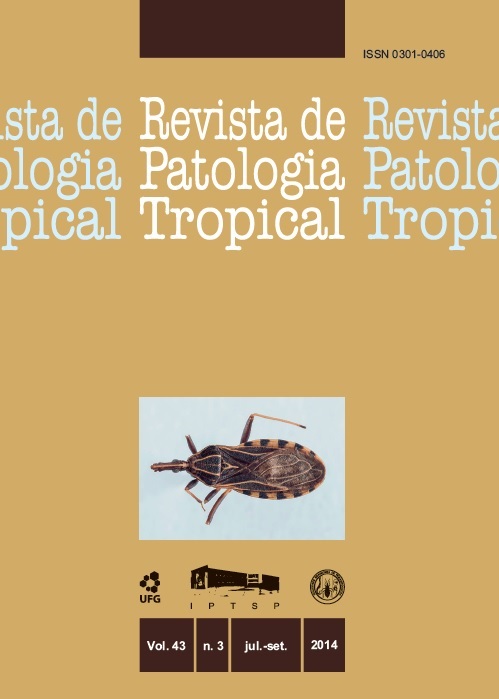PARASITOSES INTESTINAIS EM CRIANÇAS DE CRECHE COMUNITÁRIA EM FLORIANÓPOLIS, SC, BRASIL
DOI:
https://doi.org/10.5216/rpt.v43i3.32201Palavras-chave:
Creche, parasitos intestinais, frequência.Resumo
No presente estudo, foi observada a frequência de enteroparasitoses em crianças de 2 a 6 anos de idade, matriculadas na Creche Municipal Anjo da Guarda, na cidade de Florianópolis, Santa Catarina, Brasil. Foram analisadas 57 amostras fecais de agosto a novembro de 2012 pelos métodos de Lutz e de Faust et al. Obteve-se positividade para enteroparasitos em 61,4% das crianças, sendo encontrados os seguintes agentes etiológicos: Blastocystis hominis (40,4%), Giardia lamblia (24,6%), Entamoeba coli (22,8%), Endolimax nana (12,3%), Entamoeba histolytica/E. dispar (7,1%), Entamoeba hartmanni, Enterobius vermicularis e Iodamoeba bütschlii (1,8%). Em relação ao grau de parasitismo, 24,6% das crianças apresentavam monoparasitismo, 26,3% biparasitismo e 10,5% poliparasitismo. A faixa etária mais acometida foi a de 5 a 6 anos (72,2%). Os resultados observados mostraram elevada prevalência de protozoários intestinais e reforçam a necessidade da implantação de medidas de prevenção e educação em saúde que visem melhorar as condições de vida das crianças e dos adultos.
Downloads
Downloads
Publicado
Como Citar
Edição
Seção
Licença
The manuscript submission must be accompanied by a letter signed by all authors stating their full name and email address, confirming that the manuscript or part of it has not been published or is under consideration for publication elsewhere, and agreeing to transfer copyright in all media and formats for Journal of Tropical Pathology.

